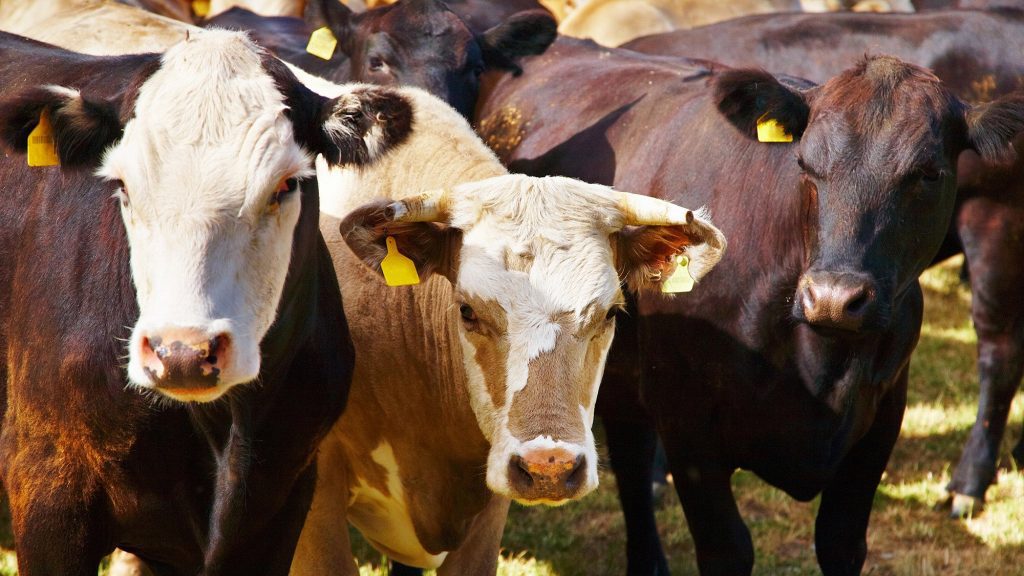This article was first published on KFF Health News.
Headlines are spreading after the Department of Agriculture confirmed that the H5N1 bird flu virus has infected dairy cows around the country. Tests have found the virus among cattle in nine states, particularly in Texas and New Mexico, and most recently in Colorado, as stated by Nirav Shah, principal deputy director at the Centers for Disease Control and Prevention, at a gathering held by the Council on Foreign Relations. May 1 event A variety of other animals have been affected by H5N1, including at least one person in Texas. However, the biggest concern for scientists is if the virus were to spread effectively from person to person. This has not occurred yet and may not happen, according to Shah. He mentioned that the CDC views the H5N1 outbreak as "a low risk to the general public at this time."
Viruses change and outbreaks can shift rapidly. Shah stated, "As with any major outbreak, this is moving at the speed of a bullet train. What we'll be talking about is a snapshot of that fast-moving train." This means that what is currently known about the H5N1 bird flu will definitely change.
With this in mind, KFF Health News explains what you need to know at present.
Q: Who can get the bird flu?
Mainly birds. However, over the last few years, the H5N1 bird flu virus has increasingly spread from birds to mammals worldwide. The expanding list of over 50 species includes seals, goats, skunks, cats, and wild bush dogs at a zoo in the United Kingdom. At least 24,000 sea lions died in H5N1 bird flu outbreaks in South America last year.
What makes the current outbreak in cattle unusual is that it is spreading rapidly from cow to cow, while the other cases, except for the sea lion infections, seem limited. Researchers are concerned because genetic sequences of the H5N1 viruses taken from cattle this year were nearly identical to one another. The cattle outbreak is also worrying because the country was caught unprepared. Researchers investigating the virus's genomes suggest it initially jumped from birds to cows late last year in Texas and has since spread among many more cows than have been tested. "Our analyses show this has been circulating in cows for four months or so, under our noses," said Michael Worobey, an evolutionary biologist at the University of Arizona in Tucson. Q: Is this the beginning of the next pandemic? Not yet. However, it's a possibility to consider because a bird flu pandemic would be a disaster. More than half of the people infected by older strains of H5N1 bird flu viruses from 2003 to 2016 died. Even if death rates turn out to be less severe for the H5N1 strain currently circulating in cattle, there could still be numerous sick people and hospitals might be too overwhelmed to handle other medical emergencies. Although at least one person has been infected with H5N1 this year, the virus cannot lead to a pandemic in its current state. For a pathogen to reach that dreadful status, it needs to make many people on various continents ill. This won't happen through occasional spillovers of the virus from farm animals to people. Instead, the virus needs to acquire mutations in order to spread from person to person, like the seasonal flu, as a respiratory infection primarily transmitted through the air as people cough, sneeze, and breathe. As we experienced during the depths of covid-19, airborne viruses are difficult to stop.
The situation of H5N1 viruses evolving within cows gives them plenty of chances to change as they reproduce. Like all viruses, they mutate as they reproduce, and mutations that improve the virus's survival are passed on. Also, because cows are mammals, the viruses could be getting better at thriving within cells that are similar to ours. know this The development of a pandemic-ready bird flu virus could be helped by a special ability of many viruses, which is the exchange of their genes with other strains in a process called reassortment.
researchers traced the origin of the H1N1 'swine flu' pandemic to events in which different viruses causing the swine flu, bird flu, and human flu mixed and matched their genes within pigs that they were simultaneously infecting. It is cautioned that pigs need not be involved this time around. Q: Will a pandemic start if a person drinks virus-contaminated milk?
Not yet. Cow's milk, as well as powdered milk and infant formula, sold in stores is considered safe because the law requires all milk sold commercially to be pasteurized. That process of heating milk at high temperatures kills bacteria, viruses, and other tiny organisms. Tests have identified fragments of H5N1 viruses in milk from grocery stores but confirm that the virus bits are dead and, therefore, harmless.
Unpasteurized 'raw' milk, however, has been shown to contain living H5N1 viruses, which is why the FDA and other health authorities strongly advise people not to drink it. Doing so could cause a person to become seriously ill or worse. But even then, a pandemic is unlikely to be sparked because the virus — in its current form — does not spread efficiently from person to person, as the seasonal flu does. Q: What should be done? A lot! Due to a lack of surveillance, the U.S. Department of Agriculture and other agencies have allowed the H5N1 bird flu to spread undetected in cattle. To address the situation, the USDA has recently mandated that all lactating dairy cattle be tested before farmers move them to other states, and the test results must be reported.
all lactating dairy cattle to be tested before farmers move them to other states, and the outcomes of the tests to be reported.
But just as restricting covid tests to international travelers in early 2020 allowed the coronavirus to spread undetected, testing only cows that move across state lines would miss plenty of cases.
Such limited testing won't reveal how the virus is spreading among cattle — information desperately needed so farmers can stop it. A leading hypothesis is that viruses are being transferred from one cow to the next through the machines used to milk them. To increase testing, Fred Gingrich, executive director of a nonprofit organization for farm veterinarians, the American Association of Bovine Practitioners, said the government should offer funds to cattle farmers who report cases so that they have an incentive to test. Otherwise, reporting just adds reputational damage atop financial loss. “These outbreaks have a significant economic impact,” Gingrich said. “Farmers lose about 20% of their milk production in an outbreak because animals quit eating, produce less milk, and some of that milk is abnormal and then can't be sold.”
The government has made the H5N1 tests free for farmers, Gingrich added, but they haven’t set aside money for veterinarians who must collect samples from the cows, transport samples, and complete paperwork. Gingrich said that the tests are the least costly part.
If testing on farms remains difficult, evolutionary virologists can still gain a lot of knowledge by examining genomic sequences from H5N1 viruses obtained from cattle. The variations between sequences reveal information about where and when the current outbreak started, the path it took, and whether the viruses are developing mutations that could be dangerous to people. However, the USDA’s slow and incomplete posting of genetic data has hindered this important research, as stated by Worobey.
The government should also assist poultry farmers in preventing H5N1 outbreaks, as these have a significant impact on bird populations and continually pose a risk of transmission to humans, according to Maurice Pitesky, an avian disease specialist at the University of California-Davis.
Waterfowl such as ducks and geese are the typical sources of outbreaks on poultry farms, and researchers can identify their proximity using remote sensing and other technologies.
remote sensing and other technologies. By focusing on potential spillover zones, farmers can direct their attention effectively. This could involve regular surveillance to identify early signs of infections in poultry, using water cannons to scare away migrating flocks, moving farm animals to a different location, or temporarily keeping them in barns. Pitesky stated that resources should be allocated to prevention. Q: OK it’s not a pandemic, but what could happen to people who get this year’s H5N1 bird flu?
No one really knows. Only one person in Texas has been diagnosed with the disease this year, in April. They were closely involved with dairy cows and experienced a mild case with an eye infection. The CDC became aware of this case through its surveillance process.
worked closely with dairy cows, and had a mild case with an eye infection. The CDC found out about them because of its surveillance process. Clinics are supposed to alert state health departments when they diagnose farmworkers with the flu, using tests that detect influenza viruses, broadly. State health departments then confirm the test, and if it’s positive, they send a person’s sample to a CDC laboratory, where it is checked for the H5N1 virus, specifically. “Thus far we have received 23,” Shah said. “All but one of those was negative.”
State health department officials are also monitoring around 150 people, he said, who have spent time around cattle. They’re checking in with these farmworkers via phone calls, text messages, or in-person visits to see if they develop symptoms. And if that happens, they’ll be tested.
Another way to assess farmworkers would be to check their blood for antibodies against the H5N1 bird flu virus; a positive result would indicate they might have been unknowingly infected. But Shah said health officials are not yet doing this work.
“The fact that we’re four months in and haven’t done this isn’t a good sign,” Worobey said. “I’m not super worried about a pandemic at the moment, but we should start acting like we don’t want it to happen.”
KFF Health News
is a national newsroom that produces in-depth journalism about health issues and is one of the core operating programs at KFF—an independent source of health policy research, polling, and journalism. Learn more about
to KFF Health News’ complimentary Morning Briefing. H5N1 is harmful to poultry and dairy cattle. and other technologies. By zeroing in on zones of potential spillover, farmers can target their attention. That can mean routine surveillance to detect early signs of infections in poultry, using water cannons to shoo away migrating flocks, relocating farm animals, or temporarily ushering them into barns. “We should be spending on prevention,” Pitesky said.
Q: OK it’s not a pandemic, but what could happen to people who get this year’s H5N1 bird flu?
No one really knows. Only one person in Texas has been diagnosed with the disease this year, in April. This person worked closely with dairy cows, and had a mild case with an eye infection. The CDC found out about them because of its surveillance process. Clinics are supposed to alert state health departments when they diagnose farmworkers with the flu, using tests that detect influenza viruses, broadly. State health departments then confirm the test, and if it’s positive, they send a person’s sample to a CDC laboratory, where it is checked for the H5N1 virus, specifically. “Thus far we have received 23,” Shah said. “All but one of those was negative.”
State health department officials are also monitoring around 150 people, he said, who have spent time around cattle. They’re checking in with these farmworkers via phone calls, text messages, or in-person visits to see if they develop symptoms. And if that happens, they’ll be tested.
Another way to assess farmworkers would be to check their blood for antibodies against the H5N1 bird flu virus; a positive result would indicate they might have been unknowingly infected. But Shah said health officials are not yet doing this work.
“The fact that we’re four months in and haven’t done this isn’t a good sign,” Worobey said. “I’m not super worried about a pandemic at the moment, but we should start acting like we don’t want it to happen.”
KFF Health News is a national newsroom that produces in-depth journalism about health issues and is one of the core operating programs at KFF—an independent source of health policy research, polling, and journalism. Learn more about KFF.
Subscribe to KFF Health News’ free Morning Briefing.









